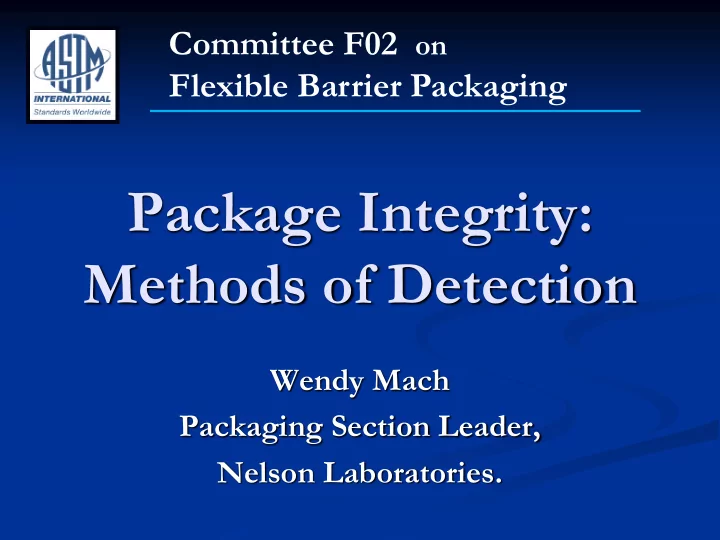

Committee F02 on Flexible Barrier Packaging Package Integrity: Methods of Detection Wendy Mach Packaging Section Leader, Nelson Laboratories.
Agenda Define package integrity Define Leak Methods of detection (ASTM options) Visual Inspection Dye Penetration Bubble Emission Container Closure Helium Tracer gas
What is Package Integrity? ASTM F17-08 “the physical capability of a given package to protects its contents with the desired level of protection over a defined period of service.”
Package Integrity A barrier to physical, microbiological or chemical challenges
What is a Leak? ASTM Definition – F17-08 “ Any opening in a flexible packaging that is contrary to intention and either lets contents escape or permits substances to enter.”
Example of Leak
Leak rates are continuous
ASTM test methods Non-destructive Destructive Visual Inspection Bubble Emission Pressure Decay Dye Penetration Tracer Gases Tracer Gases Vacuum Decay
Visual Inspection
Visual Inspection Human Leak Inspector Easiest and Least Expensive Least Sensitive (10-1 cm3/s threshold) Limitation - Human Ocular Resolution = ~40- 50 mm Operator skill variability, fatigue, error, training
Visual Inspection Example of crease through a seal.
Dye Penetration Involves injecting dye into the package Placing the weight of the solution against each portion of the seal for a specific length of time Examine package for evidence of seal failure Examination by visual or microscopic Demonstrated by dye slipping through the seal Sensitivity dependent on the solution used Alcohol, surfactants change the surface tension
Dye Penetration
Dye Penetration
Bubble Emission Involves inflating the package and submerging it into a surfactant solution Package examined for evidence of seal failure or holes in packaging, demonstrated by bubbles emerging through the seal
Bubble Emission
Bubble Emission
Container Closure Integrity
Container Closure An integrity test for rigid containers, based on concepts from ASTM D4991 Samples are exposed to methylene blue dye for a specific time under vacuum. Samples can be verified for the presence of the dye in the sample matrix with either visual inspection or UV/Vis Ensure the dye is not inhibited by the matrix
Pressure Decay An inflation leak test in which a non-porous package or product is pressurized to a preset level. After the package has stabilized, the decay in pressure over a preset test time is evaluated to determine if a leak is present. 100
Pressure/Vacuum Decay chart
Helium Tracer Gas Two methods outlined in the ASTM method Sniffer Mode The package is scanned externally Higher variability based on how the package is handled Vacuum Mode Package is filled with helium and sealed closed Placed in a chamber and pressurized
Helium Tracer Gas Can apply to a variety of packages including: Flexible Semi-rigid Rigid Not a test for porous materials Vacuum chamber is completely customizable
Other options.. O2, ASTM F2714 Oxygen Headspace Analysis Using Fluorescent Decay and ASTM New Standard Oxygen Analysis of Packages Using Headspace Sampling CO2, ASTM F2227 Nondestructive Detection of Leaks in Trays by CO2 and ASTM F2228 Nondestructive Detection of Leaks in Porous Packaging by CO2 Water Vapor H2, ongoing research
ASTM test methods F1886 Test Method for Determining Integrity of Seals for Medical Packaging F1929 Test Method for Detecting Seal Leaks in Porous Medical Packaging D3078 Test Method for Determination of Leaks in Flexible Packaging by Bubble Emission F2095 Test Method for Pressure Decay Leak Test for Flexible Packages With or Without Restraining Plates
ASTM test methods F2096 Test Method for Detecting Gross Leaks in Medical Packaging by Internal Pressurization F2227
Questions? Wendy Mach, Nelson Laboratories Inc. 801-290-7810
Recommend
More recommend